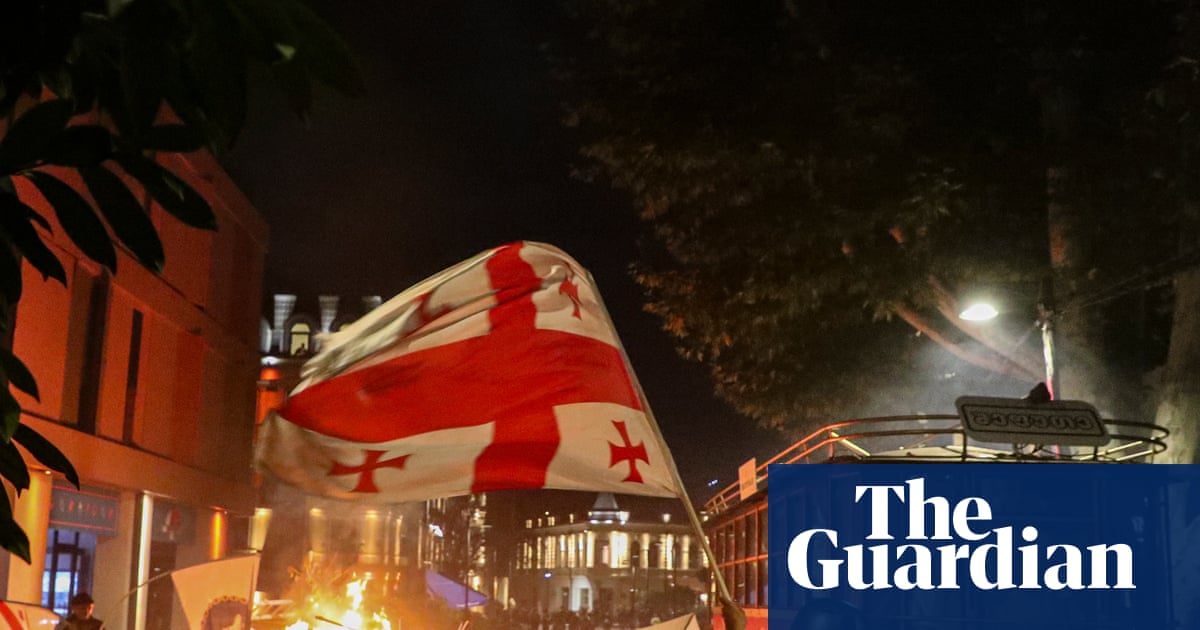Georgia’s prime minister announces crackdown on dissent after Tbilisi protests | Georgia

Georgia’s prime minister, Irakli Kobakhidze, has announced a sweeping crackdown on dissent, accusing demonstrators who tried to storm the presidential palace of aiming to topple his government and blaming the European Union for interference in his country.
Kobakhidze levelled his allegations a day after protesters attempted to breach the presidential palace as local elections were being held. They were stopped by riot police using pepper spray and water cannon.
“No one will escape responsibility. This includes political responsibility,” the Georgian news agency Interpress quoted the prime minister as saying.
Officers detained at least five demonstrators, including two members of the United National Movement, the largest opposition party, and the opera singer turned activist Paata Burchuladze.
Local media cited the health ministry as saying 21 members of the security forces and six demonstrators had been injured in clashes in the centre of Tbilisi.
The South Caucasus country has been in turmoil since Kobakhidze’s ruling Georgian Dream (GD) party claimed victory in last year’s parliamentary election, which the pro-EU opposition says was stolen. Since then, Tbilisi’s talks on joining the bloc have been frozen.
Kobakhidze said up to 7,000 people attended Saturday’s opposition rally but their “attempt to overthrow the constitutional order” had been thwarted despite what he said was EU backing.
“Several people have already been arrested – first and foremost the organisers of the attempted overthrow,” he told reporters, saying the country’s main opposition force “will no longer be allowed to be active in Georgian politics”.
Opposition figures had called for a “peaceful revolution” against GD, which they accuse of being pro-Russian and authoritarian. The party has been in power since 2012.
Thousands of protesters gathered in the heart of the capital, waving Georgian and EU flags, after months of Kremlin-style raids on independent media, restrictions on civil society and the detention of dozens of opponents and activists. The jailed reformist ex-president Mikheil Saakashvili had urged supporters to protest on election day for what he called the “last chance” to save Georgian democracy.
Kobakhidze accused the EU’s ambassador to Georgia, Paweł Herczyński, of meddling. “You know that specific people from abroad have even expressed direct support for all this, for the announced attempt to overthrow the constitutional order,” he said, adding that Herczyński “bears special responsibility in this context”.
“[Herczyński] should come out, distance himself and strictly condemn everything that is happening on the streets of Tbilisi,” said Kobakhidze.
after newsletter promotion
In July, the EU’s diplomatic service rejected what it called “disinformation and baseless accusations” about the EU’s alleged role in Georgia.
The pro-western opposition has been staging protests since last October, when GD won a parliamentary election that its critics say was marred by fraud. The party has rejected accusations of vote-rigging. GD claimed victory in every municipality across the country of 3.7 million people in an election boycotted by the two largest opposition blocs.
Georgia has the aim of EU accession written into its constitution and has long been among the most pro-western of the Soviet Union’s successor states. Its ties with the west have been strained since Russia’s full-scale invasion of Ukraine in 2022.
GD is controlled by its founder, Bidzina Ivanishvili, the country’s richest man and a former prime minister, and denies it is pro-Moscow. It says it wants to join the EU while preserving peace with Russia.
Reuters and Agence France-Presse contributed to this report
Source link

